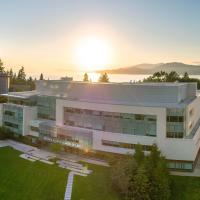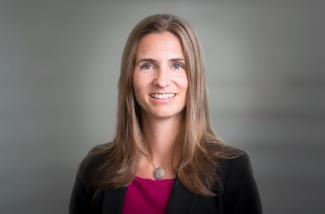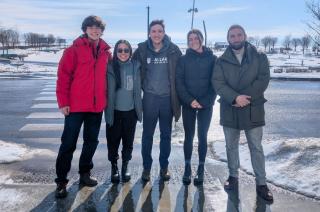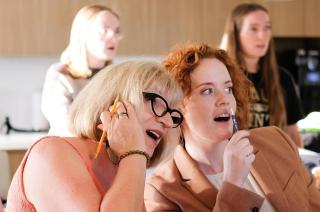From costume to courtroom: Robin Gage’s journey in law

Allard Law
Mar 7, 2024

As a child, Robin Gage (LLB ’01) wasn’t entirely sure what a lawyer did, but she knew she wanted to be one.
Today, Robin’s legal practice is driven by a passion for equality and social justice. As Managing Partner at Arvay Finlay, she focuses on areas of public law including environmental, Aboriginal, human rights, administrative and employment law.
Since graduating from Allard Law in 2001, Robin has appeared at all levels of court. She recently acted as counsel for the intervenor West Coast LEAF Association in a judicial review of a human rights decision relating to discrimination in BC’s child welfare system. She is now acting as co-counsel on behalf of the Harm Reduction Nurses Association in a constitutional challenge to BC’s public drug consumption laws.
Having benefitted from mentorship herself as a young law student and lawyer, Robin is also committed to mentoring law students and young lawyers and to ensuring the legal landscape is a safe and accessible place. She currently serves as Chair of the Canadian Bar Association of BC’s (CBABC) Court Services Committee, which works to update and improve court services across the province.
In this Q&A, Robin reflects on her path to law and the ways her legal practice continues to evolve.
Equality, access to justice, and breaking down harmful barriers are all considerations at the center of your work. How do you continue to ground your career in these considerations?
I’ve certainly always wanted to ground my career in considerations of social justice and equality. However, through my work, I have come to realize that the ideal of using the law as a tool for equality and social justice can only be realized where the legal landscape is a safe and accessible place. Unfortunately, this is often not the case for many people and communities that are most in need of these tools. In that sense, I would say that my focus has shifted somewhat to include a greater focus on access to justice.
I continue to keep social justice ideals central to my practice in Aboriginal and constitutional law. Although it can also be frustrating given that the law is a blunt tool that is not always an effective way to address these issues, particularly where the injustice is rooted in a long history of colonialism and other discriminatory practices. My practice areas are consistently evolving – sometimes in response to societal changes, and sometimes at the forefront of that change. Accordingly, these are areas that maintain and reward intellectual curiosity and creativity and that certainly keep you from getting bored (or resting on your laurels).
The CBABC’s Court Services Committee aims to improve access to court services in BC. What important changes have you seen through your work with the Committee?
There have traditionally been significant barriers to modernizing the court systems. However, through my work with the committee, I have seen important advocacy work aimed towards modernizing the court system and making it more accessible and user friendly, including through the use of technology for everything from booking court hearings online to virtual appearances. There has been greater willingness on the part of the courts in BC to listen to the experience of court users and try to improve that experience. While there are many ways the system could be made more efficient and accessible, in my view, the biggest barrier to improving the system is the lack of resources being devoted to the court system – from a failure to address judicial vacancies, to understaffing of court personnel more generally and increasingly aging infrastructure.
What was your path to law school? Did you always know you wanted to be a lawyer?
I did, in fact, always want to be a lawyer. Although when I was younger, I don’t think I understood why, or what a lawyer really did. My family loves to tell the story about when I was 11 or 12 years old and dressed up as a lawyer for Halloween (nerd alert!).
I grew up in Victoria (a transplant from Manitoba), and following high school I moved to London, Ontario to pursue my undergrad in political science at Huron College/Western University. I took one year off after undergrad to work and travel before beginning law school in the fall of 1998.
What role has mentorship played in your legal career? Was there someone who inspired you to pursue law or a specific area of the law?
I largely credit my mother for my choice to focus my practice on public law. She raised us all with a focus and interest in social justice, and my siblings and I have all carried this forward in different ways.
Since I embarked on my legal career, mentorship from my colleagues has played an extremely important role in how my interest in social justice is channeled into my work. I recognize that I have been extremely lucky to have had amazing mentors.
During law school I worked with Tom Berger, and subsequently articled and worked with Joseph Arvay and Murray Rankin. It is difficult to think of three more influential figures in the world of public law. However, my two biggest legal mentors have been my two law partners, Catherine Boies Parker and Mark Underhill, with whom I have been lucky to work with and learn from for the last 20+ years. They are two of the best lawyers I know, and it’s a pretty remarkable thing to be able to work alongside great friends for that long.
Rapid questions with Robin
What do you do to de-stress after a long day in court/at the office? I spend a lot of time watching sports. Often my own kids, but I’ve been known to spend all day in a basketball gym even when my kids aren’t playing. Plus, I’m a die-hard Blue Jays fan.
If you weren’t a lawyer, what career path would you have followed instead? I could see myself as a public servant somewhere, or maybe working for a non-profit. I have lots of teachers in my family and that is such important work, but I am pretty sure I would be terrible at that – best to leave that to the experts and stay in my lane!
- Allard School of Law
- Alumni & External Relations


